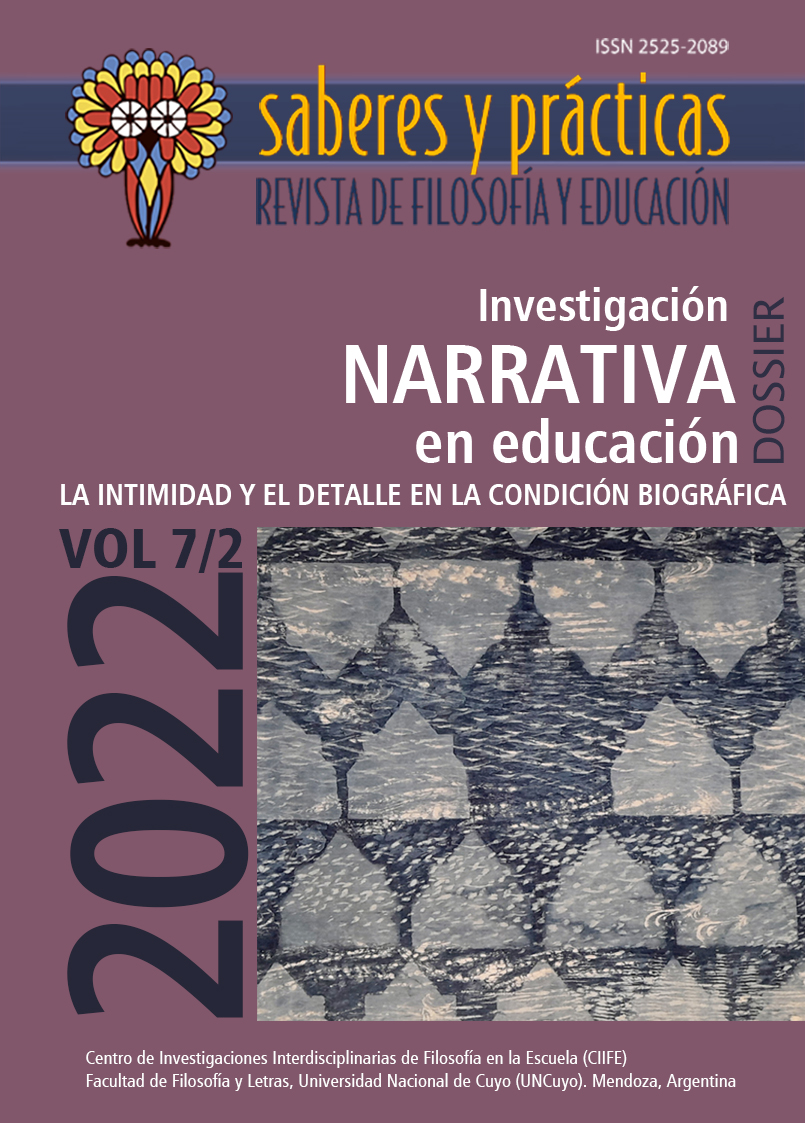The teaching of philosophy in a context of pandemic and virtuality
Analysis and reflections from an experience of teaching practice
DOI:
https://doi.org/10.48162/rev.36.061Keywords:
virtual education, COVID 19 pandemic, teaching philosophy, philosophy of education, pedagogical practiceAbstract
. In this paper I propose to address the problem of teaching philosophy in a context of virtuality and pandemic. In particular, I focus on the reflections that were constituted from my experience of teaching practice as a training instance in the philosophy teaching career carried out during the year 2020. Throughout the development, I will trace a path based on the different questions that have arisen: how do we think about education in virtuality? And more specifically, how do we approach the teaching of philosophy in a context with these characteristics? What happens when meetings are completely mediated by digital technologies? Is it possible to carry out a teaching of philosophy? From these questions I will support the idea that virtual practice can be effectively constituted as a genuine space where it is possible to approach the teaching of philosophy.
Downloads
References
Benvegnú, M. A. y Segal A. (2020) Acerca de ganar y de perder, ¿la clase en modo pantalla? En I. Dussel, P. Ferrante y D.Pulfer, Darío (Comps.) Pensar la educación en tiempos de pandemia: entre la emergencia, el compromiso y la espera. (pp. 267-278).UNIPE.
Cerletti, A. (2008) La enseñanza de la filosofía como problema filosófico. Libros del Zorzal.
Cerletti, A. (2015a) Didáctica aleatoria de la filosofía, dialéctica del aprendizaje filosófico. En Cerletti, A. y Couló, A. (orgs.). Didácticas de la filosofía. Entre enseñar y aprender a filosofar. Noveduc, pp. 15-32.
Cerletti, A. (2015b) Didáctica filosófica, didáctica aleatoria de la filosofía. Educação. Revista do Centro de Educação, vol. 40, núm. 1, pp. 27-36.
Dussel, I. (2020) La clase en pantuflas. En Dussel, I., Ferrante, P. y Pulfer, D. (Comps.) Pensar la educación en tiempos de pandemia: entre la emergencia, el compromiso y la espera. (pp. 337-350). UNIPE.
Scotti, M. (2019) La distancia infinita: efectos y potencialidades de la participación en espacios virtuales. En El Jaber, G. (Comp.) Actas de III Jornadas de Educación a distancia y Universidad: 25 y 26 de octubre de 2018. (pp. 44-46).
Facultad Latinoamericana de Ciencias Sociales – FLACSO Sede Argentina. ISBN 978-950-9379-50-3. https://www.flacso.org.ar/wp-content/uploads/2019/07/Actas-de-III-Jornadas-Educacion-a-Distancia-y-Universidad.pdf.
Southwell, M. (2020) Oficios terrestres, o del sostenimiento de la escolaridad entre virtualidad y territorio. En I. Dussel, P. Ferrante y D.Pulfer, Darío (Comps.) Pensar la educación en tiempos de pandemia: entre la emergencia, el compromiso y la espera. (pp.163-174). UNIPE.
Terigi, F. (2020) Aprendizaje en el hogar comandado por la escuela: cuestiones de descontextualización y sentido. En I. Dussel, P. Ferrante y D.Pulfer, Darío (Comps.) Pensar la educación en tiempos de pandemia: entre la emergencia, el compromiso y la espera. (pp.243-250). UNIPE.
Zelmanovich, P. (2019) Efectos de presencia en la virtualidad. En El Jaber, G. (Comp.) Actas de III Jornadas de Educación a distancia y Universidad: 25 y 26 de octubre de 2018. (pp. 47-51). Ciudad Autónoma de Buenos Aires: Facultad Latinoamericana de Ciencias Sociales – FLACSO Sede Argentina. ISBN 978-950-9379-50-3. https://www.flacso.org.ar/wp-content/uploads/2019/07/Actas-de-III-Jornadas-Educacion-a-Distancia-y-Universidad.pdf
Published
How to Cite
Issue
Section
License
Copyright (c) 2022 Julia Antonella Palavecino
This work is licensed under a Creative Commons Attribution-NonCommercial-ShareAlike 2.5 Argentina License.





















